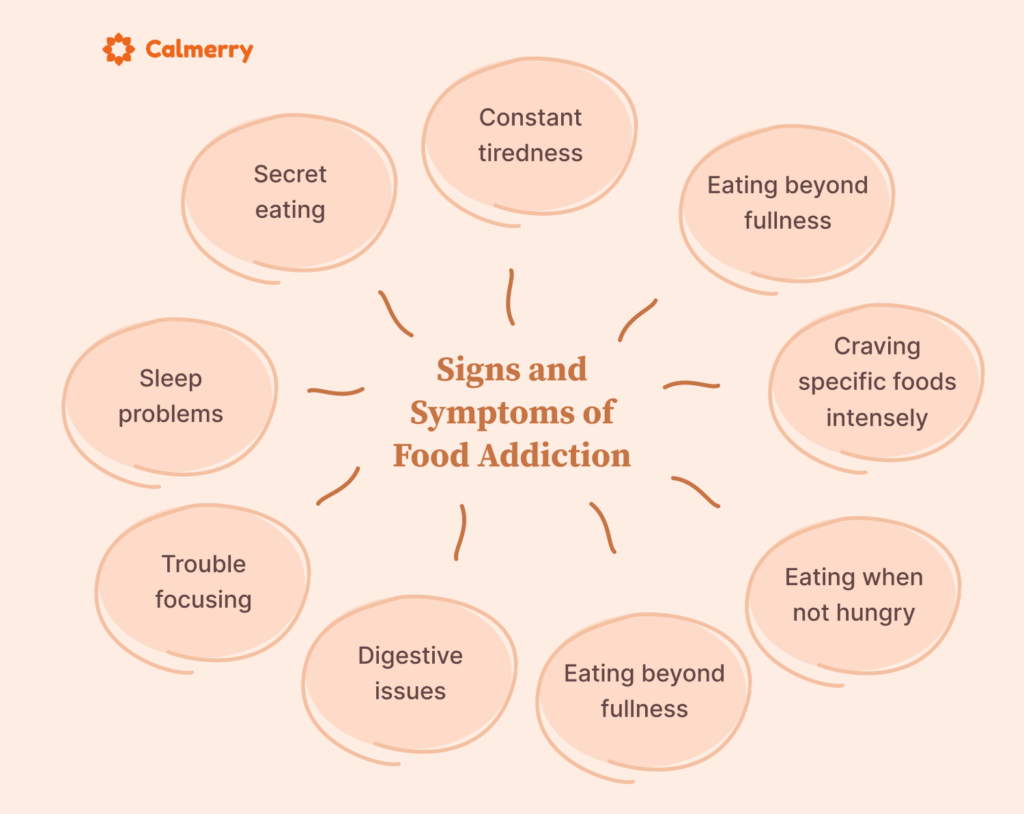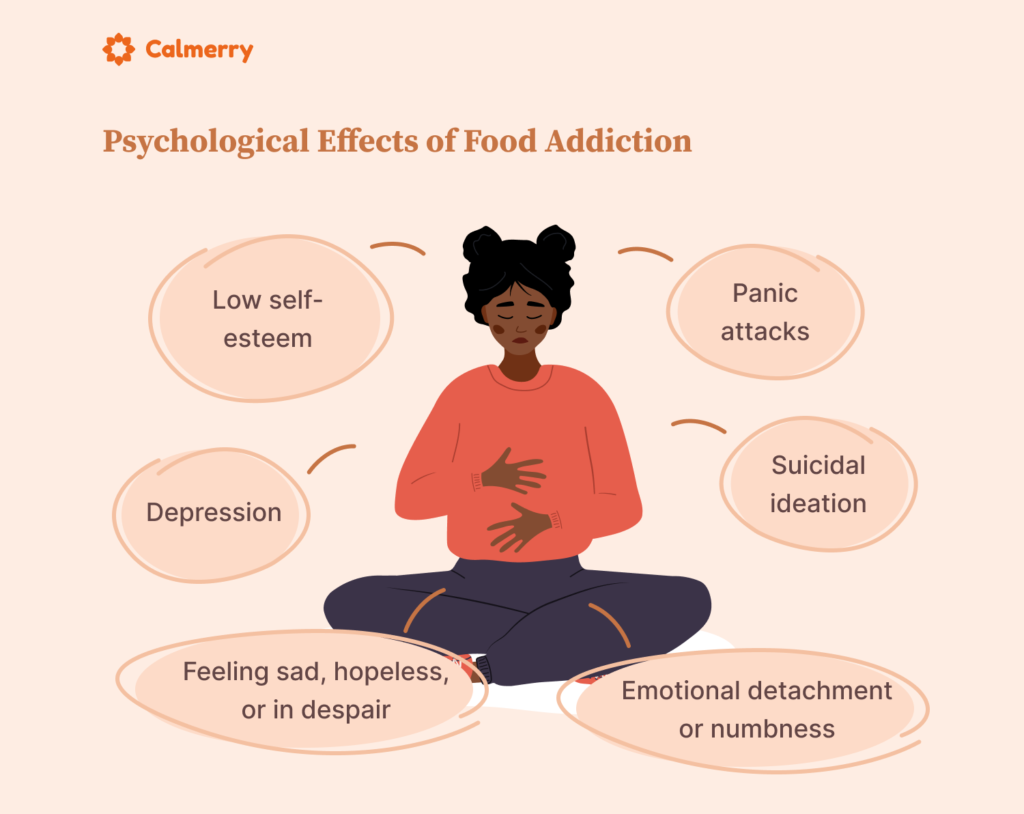Food Addiction: Causes, Symptoms, Signs and Treatment

In this article
Food addiction is a complex and often misunderstood condition characterized by compulsive eating behaviors, similar to other types of addiction. While food is essential for survival, people struggling with this addiction may crave certain foods, especially those high in sugar, fat, or salt, and find it difficult to control their consumption. Understanding the causes and signs of this condition is crucial, as it can lead to physical health issues, emotional distress, and a cycle of guilt and shame.
Food addiction also shares similarities with substance abuse disorders, as it involves cravings, withdrawal symptoms, and a loss of control over consumption.
In this article, we’ll explore food addiction signs and treatments to help you or someone you care about regain control and build a healthier relationship with food.
What is food addiction?
Food addiction is a behavioral addiction characterized by an uncontrollable urge to consume certain types of foods rich in sugar, fat, and salt.
Even though food should nourish the body, people with food addiction struggle every day with binge eating disorder, consuming large amounts of food despite feeling full, and experiencing withdrawal symptoms when attempting to stop eating specific trigger foods.
The Yale Food Addiction Scale (YFAS) is a key tool developed to identify signs of food addiction, including obsessive eating patterns, inability to control food consumption, and continued eating despite negative consequences. [1] Yale Food Addiction Scale. (n.d.). https://sites.lsa.umich.edu/fastlab/yale-food-addiction-scale/
This addiction involves a cycle where addictive food is used as a coping mechanism, leading to poor eating habits and loss of control over eating behaviors. Food addiction typically manifests in behaviors such as hiding eating habits, feeling intense guilt, and repeatedly failing to limit intake of certain foods, which can contribute to obesity and other health issues.
Recent research highlights that ultra-processed food addiction affects about 14-20% of people globally and is linked to altered brain reward pathways and withdrawal signs. [2] LaFata, E. M., Allison, K. C., Audrain-McGovern, J., & Forman, E. M. (2024). Ultra-Processed food addiction: a research update. Current Obesity Reports, 13(2), 214–223. https://doi.org/10.1007/s13679-024-00569-w
How food addiction differs from other eating disorders
Addiction to food involves a compulsive need to eat particular foods, even when not hungry. Such people typically experience an inability to stop eating a certain food, such as ice cream or junk food, and may use food to release stress or emotional pain. Unlike other eating disorders, food addiction is characterized by a continuous pattern of disordered eating rather than episodic binges.
Food addiction is also associated with obesity and can lead to severe health issues if left untreated. While in restrictive eating disorders, control over eating is central, people suffering from food addiction struggle with the severity of the addiction and a cycle of craving and overconsumption.
Effects of food addiction
Eating disorders can have serious consequences for both physical and mental health. Physically, it often leads to chronic diseases linked to addiction and obesity (diabetes, heart disease, fatty liver), digestive problems, sleep disorders, and chronic pain. Over time, individuals may also develop conditions like metabolic syndrome, osteoporosis, and an increased risk of stroke. Despite overeating, malnutrition and vitamin deficiencies are common due to a diet high in sugar, fat, and salt but low in essential nutrients.
Psychologically, food addiction is linked to depression, anxiety, low self-esteem, mood swings, and social isolation. Many individuals experience guilt, shame, and emotional distress about their eating patterns, which can further fuel the addiction.
What causes food addiction?
Causes of food addiction involve biological, psychological, and environmental factors. Research shows that highly processed, hyperpalatable foods can trigger the brain’s reward system, releasing dopamine and serotonin in ways similar to addictive drugs. [3] Gordon, E. L., Ariel-Donges, A. H., Bauman, V., & Merlo, L. J. (2018). What Is the Evidence for “Food Addiction?” A Systematic Review. Nutrients, 10(4), 477. https://doi.org/10.3390/nu10040477
Over time, repeated exposure to these foods can lead to changes in brain chemistry, requiring larger amounts to achieve the same pleasurable effects.
Genetics also plays a role, making some individuals more susceptible to inherited traits.
Psychological factors such as stress, trauma, depression, and poor coping mechanisms further increase vulnerability, as people may use food to manage negative emotions.
Dysfunctional eating patterns, impulsivity, and a history of substance use or mental health disorders are additional risk factors.
Signs and symptoms you may be addicted to food
Food addiction manifests through intense cravings, loss of control over eating patterns, and continued consumption despite negative physical or emotional consequences, often mirroring patterns seen in substance dependency.
Intense cravings & loss of control
People with eating disorders struggle with intense cravings and an inability to stop eating, even when full. This cycle often leads to eating large quantities beyond physical comfort. The severity of the addiction can mirror substance use, making it hard to resist urges.
Eating to the point of discomfort
Symptoms of food addiction include gorging until feeling ill, which is common in food dependency. For many, food can also become a coping mechanism, turning to comfort foods like eating ice cream excessively. This behavior reinforces the dependence and makes breaking the habit difficult.
Going out of your way to obtain certain foods
A person with an eating disorder may prioritize getting specific foods. This behavior is associated with food cravings similar to substance addiction. The severity of the addiction can determine how much effort is put into obtaining these foods.
Eating when not hungry
Food dependency involves eating even when not physically hungry, driven by emotional cravings. A person with food addiction may feel powerless to stop eating a specific food. This habit can contribute to obesity and food addiction complications.
Secretive or isolated eating
Many people struggle in silence, hiding their dietary habits due to shame. Eating in secret is a common sign of compulsive eating, as they use food as a coping mechanism. This isolation can worsen the emotional toll of the addiction.
Avoiding social interactions to eat
Eating disorders can lead to withdrawal from relationships and binge eating. The inability to stop eating food may take priority over social events. This behavior is a key sign of the severity of the addiction.
Work struggles due to food focus
Suffering from food dependency can impact focus and productivity at work. Signs include difficulty concentrating and chronic fatigue. Over time, this can affect job performance and stability.
Spending excessively on binge foods
Addicts may drain their finances to satisfy cravings. The cycle of food addiction often involves buying large amounts of trigger foods.
Chronic fatigue
Food addiction is likely to trigger energy crashes due to poor eating habits. Overeating can lead to sluggishness, making daily tasks harder. These signs include physical and mental exhaustion.
Difficulty concentrating
Those struggling with a food addiction often report brain fog and a lack of focus. Since food impacts brain function, dependence can disrupt cognitive performance.
Sleep disorders
Excessive craving for food may lead to poor sleep patterns, causing insomnia or excessive sleep. Eating large meals before bed may provoke discomfort and restlessness.
Restlessness without food
People with food addiction struggle with anxiety and agitation when unable to eat specific foods. This restlessness is similar to withdrawal in substance addiction. The inability to stop eating certain foods fuels this tension.
Irritability
Mood swings are common in those suffering from food dependence. When a person with a food addiction can’t eat food to release stress, they become irritated. This emotional instability is a key sign of addiction severity.
Headaches
Food addiction can trigger headaches due to sugar crashes or dehydration. Signs include frequent pain after binge episodes. This physical discomfort reinforces the struggle with food addiction.
Digestive disorders
Overeating can lead to bloating, acid reflux, and other digestive issues. Food addiction involves repeated strain on the gut, worsening these problems. Chronic overeating makes it harder to regain control over their eating.
Suicidal ideations
In severe cases, compulsive eating can lead to deep emotional distress, including suicidal thoughts. The shame and hopelessness of the addiction struggle can feel overwhelming.

What are the risk factors of food addiction?
Compulsive eating behaviors are often triggered by highly palatable foods and other key factors:
Genetics: A family history of addiction or obesity may increase susceptibility.
Mental health: Conditions like depression, anxiety, or trauma can lead to emotional eating.
Dieting & restriction: Frequent dieting may trigger binge-eating episodes.
Brain chemistry: Processed foods can activate reward pathways, similar to addictive substances.
Early exposure: Childhood habits like using food for comfort may contribute to dependency.
Social & environmental factors: Stress, easy access to junk food, and cultural norms play a role.
Physical effects
Food dependency can lead to severe physical effects, including obesity, diabetes, heart disease, and metabolic disorders.
Heart disease
Overeating unhealthy foods high in trans fats, sugar, and sodium can lead to high cholesterol, hypertension, and clogged arteries, increasing the risk of heart attacks and strokes.
Diabetes
Excessive sugar and processed food consumption can trigger insulin resistance, leading to type 2 diabetes and dangerous blood sugar spikes.
Digestive problems
Food addiction often leads to overeating, which can trigger acid reflux, bloating, irritable bowel syndrome (IBS), and other gastrointestinal issues.
Malnutrition
Consuming too many empty-calorie foods can deprive the body of essential nutrients, weakening the immune system and overall health.
Obesity
Uncontrolled overeating, especially high-calorie junk food, leads to excessive weight gain and associated health complications.
Chronic fatigue
Poor nutrition and blood sugar crashes from processed foods can leave you feeling constantly tired and drained.
Chronic pain
Inflammation from unhealthy eating patterns can worsen joint pain, muscle aches, and conditions like fibromyalgia.
Sleep disorders
Overeating, especially before bed, can disrupt sleep patterns, leading to insomnia or poor-quality rest.
Reduced sex drive
Obesity, hormonal imbalances, and low energy from poor diet choices can decrease libido and sexual function.
Headaches
Blood sugar fluctuations, dehydration, and food additives can trigger frequent headaches and migraines.
Lethargy
A diet high in sugar and processed foods can trigger energy crashes, making even simple tasks feel exhausting.
Arthritis
Excess weight and inflammation from unhealthy foods can worsen joint pain and increase the risk of arthritis.
Stroke
High blood pressure and clogged arteries from poor eating habits raise the risk of life-threatening strokes.
Kidney or liver disease
Overconsumption of sugar, salt, and unhealthy fats can damage these vital organs, leading to dysfunction or failure.
Osteoporosis
A diet lacking in essential nutrients like calcium and vitamin D weakens bones, increasing fracture risks.
Psychological effects
Low self-esteem
Struggling with cravings and overeating often reinforces negative self-perceptions.
Depression
The cycle of binge eating and guilt can contribute to persistent sadness and hopelessness. Food addiction may worsen depressive signs by creating a dependence on eating for emotional relief.
Panic attacks
The fear of losing control over food or weight gain can trigger intense panic episodes. Sudden cravings or restrictive dietary habits may also heighten anxiety, leading to panic.
Increased feelings of anxiety
Constant preoccupation with food can create chronic stress and worry. The inability to resist cravings may fuel a cycle of anxiety and compulsive eating.
Hopelessness
Failed attempts to control dietary habits can deepen emotional distress. Many with food addiction feel trapped in an endless cycle, leading to despair.
Food-related irritability
Withdrawal from highly palatable foods can provoke mood swings and frustration.
Emotional numbness
Some use food to suppress difficult emotions, leading to emotional shutdown. Over time, this can result in feeling disconnected from oneself and others.
Suicidal thoughts
In severe cases, the shame and helplessness linked to food addiction may lead to thoughts of self-harm. The perceived lack of control can make life feel unbearable for some individuals.

Foods that trigger a food addiction
Certain foods are more likely to trigger addictive eating behaviors. Processed snacks, fast food, candy, and sugary drinks stimulate the brain’s reward system, leading to cravings and overconsumption.
These foods are often designed to be hyper-palatable, making them hard to resist. Common triggers include pizza, chocolate, chips, and ice cream. Over time, frequent consumption can lead to tolerance, requiring larger amounts to feel satisfied.
How do genetics affect food addiction?
Genetics can influence a person’s susceptibility to food addiction by affecting brain chemistry and reward pathways. Variations in genes related to dopamine (the “feel-good” neurotransmitter) may increase cravings for high-calorie foods. Some people inherit a higher risk of impulsive eating or reduced satiety signals, making them prone to overeating.
Food addiction treatment and recovery
If food addiction is left unchecked, malnutrition, chronic fatigue, and metabolic disorders may develop due to poor dietary habits. Several effective approaches to food addiction treatment and recovery can help individuals regain control and build healthier relationships with food.
Food addiction therapy
Food addiction therapy helps individuals overcome compulsive eating behaviors through counseling, cognitive-behavioral therapy (CBT), and mindfulness techniques. Therapists will provide food addiction help to address emotional triggers, develop healthier coping mechanisms, and promote balanced eating rituals. Personalized treatment plans may include nutritional guidance and behavioral strategies to break the cycle of food dependence and improve overall well-being.
Medications for food addiction
Certain medications, such as naltrexone or bupropion, may help manage food addiction by reducing cravings and compulsive eating. These drugs target brain pathways linked to reward and impulse control. Always consult a healthcare provider to determine if medication is a suitable option alongside therapy and lifestyle changes.
Food addiction support groups
Support groups of Food addict anonymous, like Overeaters Anonymous (OA), provide a safe space for individuals struggling with food addiction. Sharing experiences, accountability, and peer encouragement foster recovery. Group meetings, online or in-person, offer emotional support, practical strategies, and motivation to maintain long-term healthy eating patterns.
Food addiction and substance abuse
Food behavioral addiction shares similarities with substance abuse, including cravings, loss of control, and dopamine-driven behaviors. Both conditions involve compulsive consumption despite negative consequences.
What are the treatments for food addiction?
Treating food addiction often requires a multi-faceted approach, combining therapy, medical support, and dietary changes.
Cognitive behavioral therapy (CBT)
CBT for food addiction focuses on identifying triggers (such as stress, boredom, or emotional distress) and replacing compulsive eating with healthier coping mechanisms. Techniques like thought records, behavioral experiments, and mindfulness help reframe thoughts involved with food and emotional eating.
Structured programs, such as the Craving Change model, teach skills to challenge irrational beliefs about food and self-control.
Medications
Certain FDA-approved medications, like naltrexone-bupropion (Contrave) or lisdexamfetamine (Vyvanse), may help reduce cravings and impulsive eating by targeting reward pathways in the brain.
Antidepressants like SSRIs can also be helpful if emotional eating is linked to depression or anxiety.
Important note: Only qualified healthcare providers can prescribe these medications. Medication should always be combined with therapy and lifestyle changes for the best outcomes.
Nutritional counseling
A registered dietitian specializing in food addiction can design a structured meal plan with balanced macronutrients to stabilize blood sugar and reduce cravings. Strategies like mindful eating (for example, slowing down meals, recognizing hunger cues) and avoiding trigger foods (like ultra-processed sugars) are key components. Some programs use a “food rehab” approach, gradually reintroducing forbidden foods in controlled ways to prevent bingeing.
Lifestyle modifications
Regular exercise (30 minutes of moderate activity daily) helps regulate mood and reduce stress-induced eating. Sleep hygiene (7-9 hours per night) and stress management techniques ( yoga, deep breathing) lower cortisol levels, which can trigger cravings.
How to overcome food addiction?
To overcome food addiction, start by identifying triggers and replacing unhealthy foods with nutritious alternatives. Seeking support from a therapist or support group can help address emotional eating. Building mindful eating patterns and setting realistic goals are key to long-term success.

Is food addiction hard to break?
Food addiction can be challenging to break due to emotional, psychological, and biological factors. However, with the right strategies and support, recovery is possible. Consistency and self-compassion are crucial in overcoming cravings and forming healthier habits.
What are the differences between food addiction and binge eating disorder?
Food addiction involves a compulsive need for certain foods, often driven by brain chemistry. At the same time, binge eating is characterized by consuming large amounts of food in a short time, usually due to emotional distress. Food addiction focuses on specific cravings, whereas binge eating may involve any available food. Both can overlap but require different treatment approaches.
How Calmerry can help with food addiction?
Calmerry offers personalized therapy to help you understand and manage food addiction by addressing emotional triggers and building healthier habits. Through licensed online therapists, you will receive evidence-based strategies like CBT to break compulsive eating patterns. Supportive, confidential sessions make developing a balanced relationship with food easier.
FAQ
What is food addiction?
It’s a behavioral disorder characterized by compulsive eating, similar to substance addiction. It’s defined by an inability to control cravings despite negative consequences.
What causes food addiction?
It’s often linked to brain chemistry, genetics, and psychological factors like stress or trauma. Highly palatable foods can trigger dopamine responses, reinforcing addictive behavior.
What are the common signs and symptoms of food addiction?
Common signs include obsessive thoughts about food, binge eating, and guilt after eating. Withdrawal-like symptoms may also occur when avoiding certain foods.
How is food addiction different from emotional eating or overeating?
Food addiction involves dependency and loss of control, while emotional eating is often situational. Overeating may lack the compulsive, addictive patterns seen in food dependence.
Can food addiction affect mental and physical health?
Yes, it can lead to obesity, diabetes, depression, and anxiety. The cycle of addiction also worsens self-esteem and emotional well-being.
What types of foods are most commonly associated with addiction?
While food is necessary for survival, processed, high-sugar, and high-fat foods are most addictive. These foods stimulate reward pathways in the brain.
How does food addiction impact daily life and relationships?
It can disrupt work, social life, and lead to isolation or conflict. Shame and secrecy around eating patterns often strain relationships.
What treatment options are available for food addiction?
Therapy, support groups, and nutritional counseling are common. In severe cases, medical intervention may be needed.
Can food addiction be managed without professional help?
Some succeed with self-help strategies, but professional guidance improves outcomes. Support networks and structured plans are often essential.
What are some effective coping strategies for overcoming food addiction?
Mindful eating, identifying triggers, and replacing junk food with healthier options help. Regular exercise and stress management techniques also reduce cravings.
Yale Food Addiction Scale. (n.d.). https://sites.lsa.umich.edu/fastlab/yale-food-addiction-scale/
LaFata, E. M., Allison, K. C., Audrain-McGovern, J., & Forman, E. M. (2024). Ultra-Processed food addiction: a research update. Current Obesity Reports, 13(2), 214–223. https://doi.org/10.1007/s13679-024-00569-w
Gordon, E. L., Ariel-Donges, A. H., Bauman, V., & Merlo, L. J. (2018). What Is the Evidence for “Food Addiction?” A Systematic Review. Nutrients, 10(4), 477. https://doi.org/10.3390/nu10040477
-
Learn morePersonalized online therapyChoose video, messaging, or both to fit your schedule and comfort. Get matched with your therapist within 1 hour.
-
Learn moreOne 60-minute live video sessionSee how online therapy works and get quick support with a single therapy session. No commitments.


